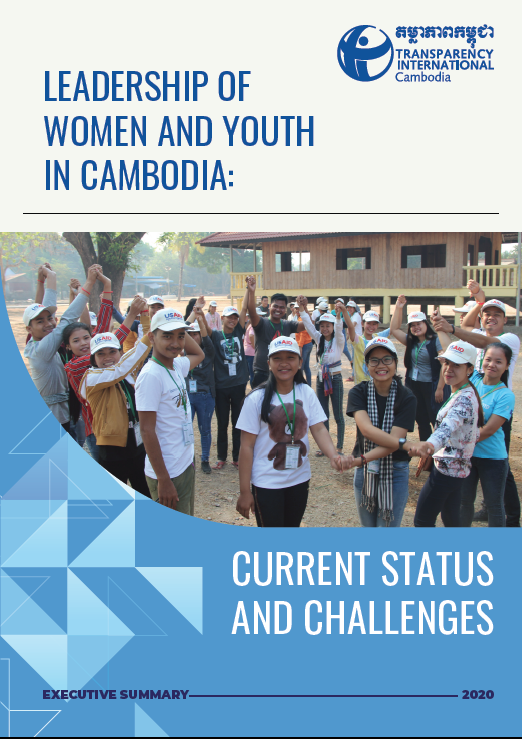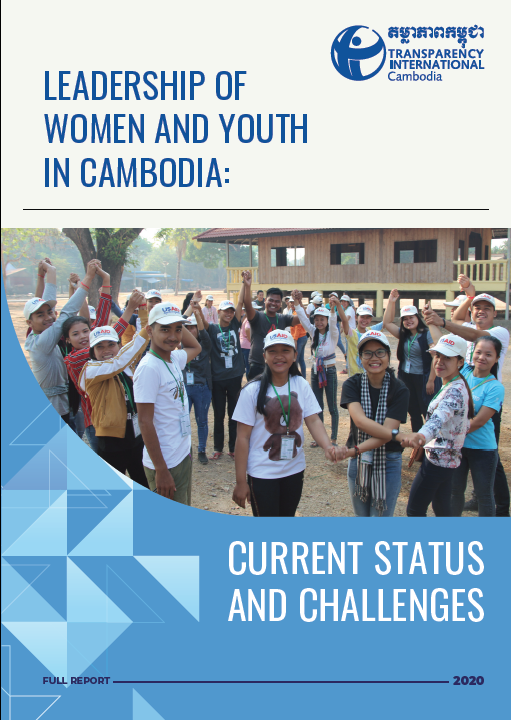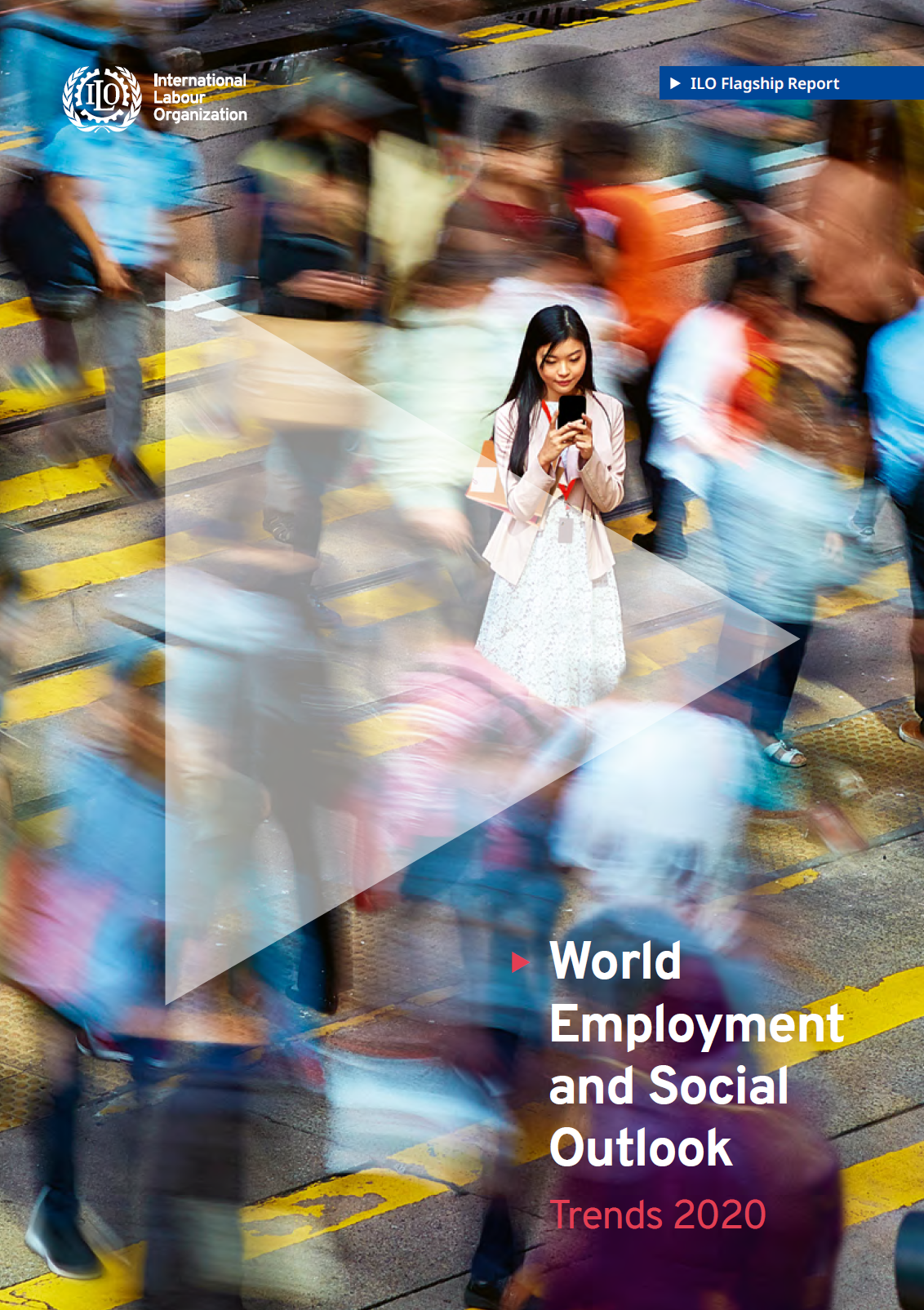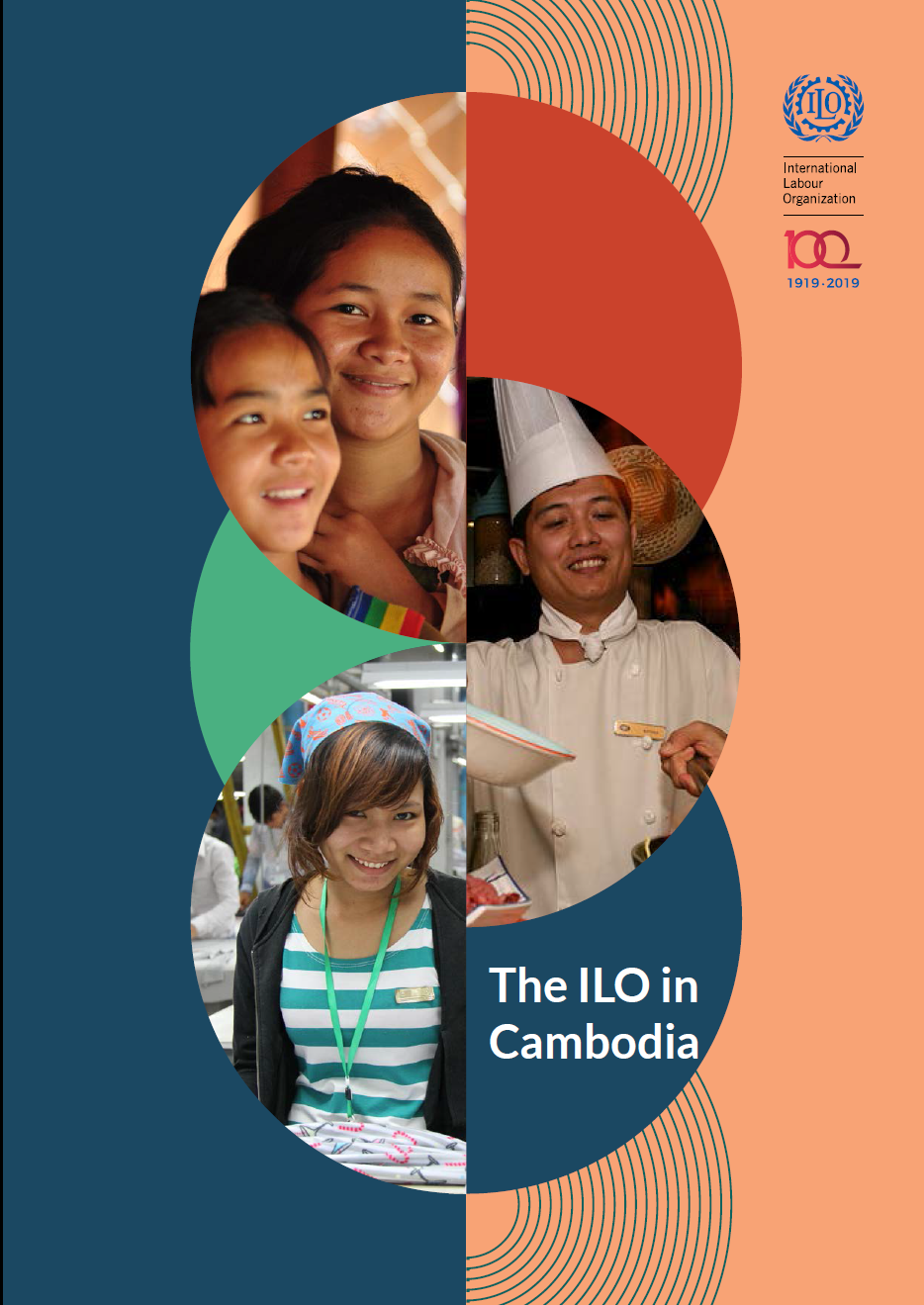
Summary report on Leadership of Women and Youth in Cambodia
Publication Year: 2020 / Sources: Transparency International CambodiaThe main objectives of the study were to:
(1) Document the recent trends in women’s and youth’s leadership in Cambodia,
(2) Identify the progress and challenges in creating an enabling environment for youth and women to effectively participate in the decision-making processes, and
(3) Create concrete recommendations for the Government, CSOs/networks, and academics (schools) to effectively promote youth and women in leadership positions for the improvement of the democratic system in Cambodia.

Full report on Leadership of Women and Youth in Cambodia
Publication Year: 2020 / Sources: Transparency International CambodiaThe main objectives of the study were to:
(1) Document the recent trends in women’s and youth’s leadership in Cambodia,
(2) Identify the progress and challenges in creating an enabling environment for youth and women to effectively participate in the decision-making processes, and
(3) Create concrete recommendations for the Government, CSOs/networks, and academics (schools) to effectively promote youth and women in leadership positions for the improvement of the democratic system in Cambodia.

World Employment and Social Outlook: Trends 2020
Publication Year: 2020 / Sources: International Labour OrganizationThe enormous challenges in the world of work – including persistent inequalities and exclusion – make it more vital than ever to establish a clear picture of global employment and social trends. This requires critical reflection on the adequacy of our methods and concepts, with innovations where needed, to address today’s policy challenges. We need to question, for example, whether the unemployment rate provides the most reliable measure of labour market underperformance. We need to understand whether or not people of working age can realize their full potential in work.
Download: English | Khmer
Human Development Report 2019: Beyond income, beyond averages, beyond today: Inequalities in human development in the 21st century
Publication Year: 2019 / Sources: United Nations Development ProgrammeIn every country many people have little prospect for a better future. Lacking hope, purpose or dignity, they watch from society’s sidelines as they see others pull ahead to ever greater prosperity. Worldwide many have escaped extreme poverty, but even more have neither the opportunities nor the resources to control their lives. Far too often gender, ethnicity or parents’ wealth still determines a person’s place in society.
Download: English | Khmer
Trafficking in Persons Report 2020
Publication Year: 2020 / Sources: U.S. Department of StateAll of Cambodia’s 25 provinces are sources for human trafficking. Sex trafficking is largely clandestine; Cambodian and ethnic Vietnamese women and girls move from rural areas to cities and tourist destinations, where criminals exploit them in sex trafficking in brothels and, more frequently, clandestine sex establishments at beer gardens, massage parlors, salons, karaoke bars, retail spaces, and non-commercial sites.
Download: English | Khmer
Trafficking in Persons Report 2019
Publication Year: 2019 / Sources: U.S. Department of StateCambodia is a source, transit and destination country for trafficked persons. Women and girls are trafficked internally for commercial exploitation. Men who migrate outside of Cambodia for work are sometimes subjected to forced labor, and some women and girls are trafficked abroad for prostitution or domestic work. Children, the disabled and the elderly are trafficked to beg or work on the streets of neighboring countries.
Download: English | Khmer
Trafficking in Persons Report 2018
Publication Year: 2018 / Sources: U.S. Department of StateCambodian trafficking victims include men, women and children, who are exploited for a variety of different purposes including numerous forms of forced labour, as well as for commercial sexual services. Victims are exploited through debt bondage and for domestic servitude, forced begging, for forced labour in the fishing, construction, food processing and agricultural industries, and for sexual services in brothels, massage parlours, salons, beer gardens and karaoke bars. Within Cambodia, trafficking victims are predominantly women and girls who are trafficked for sexual exploitation, as well as for domestic labour.
Download: English | Khmer
Trafficking in Persons Report 2017
Publication Year: 2017 / Sources: U.S. Department of StateCambodia experiences significant internal and cross-border trafficking, and is a country of origin, transit and destination for trafficked persons. Human trafficking patterns and trends in Cambodia vary from small-scale opportunistic endeavours to large-scale organised syndicates with elaborate trafficking networks.
Download: English | Khmer
Kindom of Cambodia Decent Work Country Programme 2019-2023
Publication Year: 2019 / Sources: International Labour OrganizationThe Cambodia Decent Work Country Programme (DWCP) 2019-2023 provides a framework for cooperation between the ILO, the Royal Government of Cambodia (RGC), and the social partners to contribute to the achievement of Cambodia’s national development objectives by 2030. The DWCP is the 5th such document and builds on 50 years of Cambodian membership of the ILO. The DWCP will support the implementation of the Rectangular Strategy IV, the National Strategic Development Plan 2019-2023, and the Cambodian Sustainable Development Goals (CSDGs). Priority will be placed in this context on implementation of SDG 8: Promote sustained, inclusive, and sustainable economic growth, full and productive employment, and decent work for all.
Download: English | Khmer
The ILO in Cambodia
Publication Year: 2019 / Sources: International Labour OrganizationCambodia has been a member of the ILO since 1969 and has ratified 13 ILO conventions including all eight core conventions. The ILO has operated in Cambodia since 1992 following the end of nearly three decades of internal conflicts and has implemented five Decent Work Country Programmes (DWCPs) since 2005, all in close cooperation with its constituents.
Download: English | Khmer